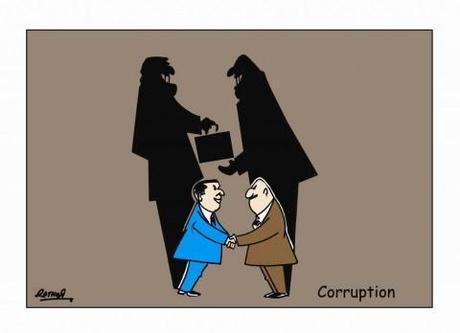
Corruption is one of the biggest challenges facing the developing world: it has a corrosive effect on democratic governance, undermines public trust, and wastes scarce resources. Crucially, corruption also represents a destructive tax on the private sector that hampers economic growth and development prospects.
A new paper by the Center for Strategic and International Studies’ (CSIS) Project on Prosperity and Development, The Costs of Corruption: Strategies for Ending a Tax on Private-sector Growth, estimates that narrowly-defined private sector corruption in 105 developing countries amounts to over $500 billion, 3.7 times the amount of official development assistance in 2011. While businesses are often blamed for corruption, and in particular bribery, the paper recognizes that corruption has both supply and demand sides, and that while businesses may contribute to corruption, they are also victims of it. As such, business must be a part of successful solutions to the corruption problem.
This is the point that CIPE constantly emphasizes – and applies – in its work around the world. In fact, the report cites numerous examples of CIPE’s successful anti-corruption programs, including collective action among leading companies in Thailand, legal reforms to guarantee disclosure of procurement contracts in Egypt, work on corporate governance and SME policy advocacy in Russia, improving public procurement transparency and governance in Kosovo, streamlining Armenia’s tax code, and strengthening property rights and supporting legal institutions in Kenya.
Braving inclement weather in Washington, DC last week, a distinguished panel of anti-corruption experts hosted by Dan Runde, Director of the Project on Prosperity and Development and William A. Schreyer Chair in Global Analysis gathered at CSIS to mark the paper’s launch and discuss the way forward for the private sector, governments, and donors on combating corruption.
Roderick Hills, Chairman and Co-Founder of the Hills Program on Governance at CSIS, stressed the force of disclosure in fighting corruption, since the lack of transparency is the leading culprit of abuses. Rolf Alter, Director of Public Governance and Territorial Development Directorate at the OECD, added that one key factor in the uphill battle against corruption remains the loss of trust in the private sector and governments alike following the global financial crisis and slow recovery in many parts of the world including the U.S. and Europe.
Michael Gadbaw, Former Vice President and Senior Counsel at General Electric, emphasized that following the passage of 1997 OECD Anti-Corruption Convention, 2003 UN Convention against Corruption, as well as various national laws prohibiting bribery of foreign officials, the global community now has the tools to eliminate grand corruption. Multinational companies are well aware of the risks involved and have taken significant steps to mitigate corruption risks in their operations around the globe. GE, for one, made integrity a competitive advantage, showing that it is possible to achieve high business performance with high integrity. Gadbaw noted that the tougher tasks were eliminating systemic and petty corruption, which remain ingrained in many countries.
Pamela Passman, President and CEO of the Center for Responsible Enterprise and Trade, further noted that it’s crucial for companies not only to get their own house in order when it comes to anti-corruption compliance but also ensure that the same standards are propagated in global value chains through appropriate training. Assessment, evaluation, and continues improvement of compliance programs can therefore become a competitive differentiator for local companies in emerging markets.
Michael Hershman, President and CEO of the Fairfax Group, co-founder of Transparency International, and CIPE Board member, provided a practical example from CIPE’s work of companies acting together to combat corruption, which was also cited in the CSIS report. In Thailand, CIPE together with the Thai Institute of Directors has helped to assemble a voluntary coalition of major domestic and international companies that committed to specific steps in anti-corruption compliance. Unlike many other voluntary standards of conduct, this commitment involves third party verification, which makes it more credible.
The CSIS paper reiterates why it is important for the business community to fight corruption, citing the business case against corruption made by the International Chamber of Commerce and others, including CIPE:
“The [prisoner's] dilemma can be overcome only by collective action from the business community by working toward a transparent environment and rule of law for doing business. This can be accomplished through collective corporate action, international standards of transparency, conduct and accountability among industry actors and value chains, international agreements among governments with the involvement of the private sector, improved rule of law, and increased independence in media and various forms of political and legal accountabilities. (…)
Local companies, particularly medium and large companies, can only benefit from global trade and access to global value chains, particularly those of multinational corporations, by creating anticorruption compliance programs. As one study notes, ‘Entrepreneurs can only grow into global value chains if they take steps to stop their own firm-level corruption.’”
If you missed this lively event, a video recording of the discussion is available on CSIS website along with the report.
Anna Nadgrodkiewicz is Director of Multiregional Programs at CIPE.

